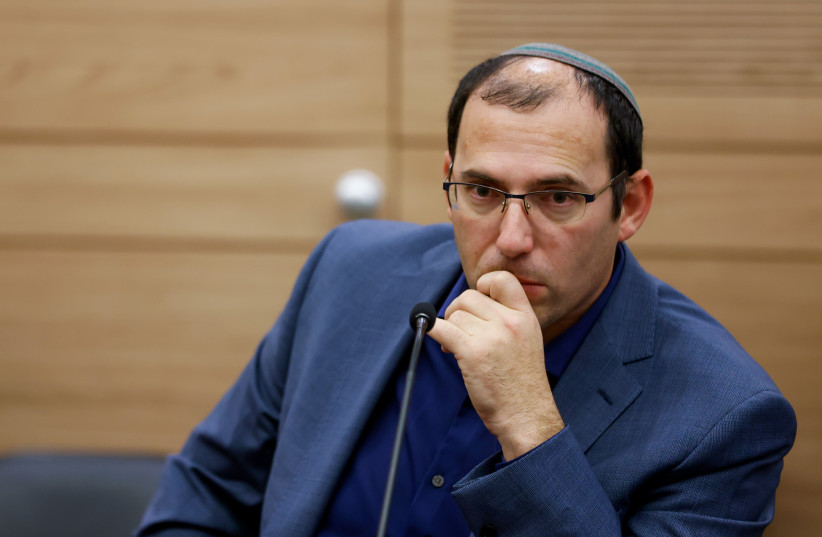The Friedmann judicial reform outline requires compromises from both sides, drafters Prof. Yuval Albashan and businessman Giora Yaron explained as they presented their proposal to the Constitution, Law and Justice Committee on Monday.
Albashan and Yaron, who drafted the outline along with former justice minister Prof. Daniel Friedmann and Maj.-Gen. (res.) Giora Eiland, said that there were parts of the outline that both sides of the table would like and dislike.
“The judicial system, especially the High Court [of Justice], needs a very big reform. We reached compromises. You will do the calibration. We took all the disputes and tried to reduce them to smaller fronts.”
Yuval Albashan
"The judicial system, especially the High Court [of Justice], needs a very big reform. We reached compromises. You will do the calibration. We took all the disputes and tried to reduce them to smaller fronts," explained Albashan. "This insane drive will lead the state into the abyss and there are people who want us to reach anarchy and constitutional chaos. And for a long time, it's not about only Bibi (Prime Minister Benjamin Netanyahu) or not Bibi."
Albashan said that as a leftist, he wanted to see an outline that would focus on things such as equal rights for Arab citizens, but he had to find an outline that would be a basis for negotiation. He emphasized that the numbers in the proposal were not final, as The outline's objective was to get two sides to discuss.
The "honor games" needed to stop, said Albashan, and it had been a mistake of the coalition to not accept the opposition's negotiation precondition of cessation of legislation, and the opposition had made a mistake of demanding the cessation of legislation as a precondition to negotiation.

Yaron noted that both sides had to accept that "perfect is the enemy of the good," and that no one was going to get everything that they wanted.
"If we don't solve this problem, none of us will come out innocent," said Yaron. "If we want to ruin the State of Israel this is certainly the best way to do it."
Yaron said that Constitution, Law and Justice Committee chairman Simcha Rothman didn't receive the 10 commandments in Sinai, and called for the end of self-righteousness from the opposition and coalition.
What's the most notable part of the judicial reform outline?
The most notable part of the outline is the change of the Judicial Selection Committee. It would have 12 members on the panel, four from the coalition, four from the opposition and four judges. The justice minister would have one appointment veto per term, as would the High Court president, though the judges would largely have observer status on the committee. Two judicial appointments would occur at a time, one by the opposition and one by the coalition. High Court appointments would require an eight-person consensus.
The outline holds that there would be no judicial review on basic laws, and establish a special method for introducing the quasi-constitutional legislation.
"It's not enough to call them Basic Laws," said Albashan.
Basic Laws would require four readings with 70 votes, with the final reading in the following Knesset.
Albashan explained that this would mean that the legislation would be approved by majorities from two different Knessets. Basic Law amendments would require three readings with a 70 MK majority.
The outline also called for a Basic Law for enlistment for yeshiva students and religious Jews.
Judicial review of regular law only by the High Court, by three-quarters of the High Court. The plan also includes provisions for an override clause, which if implemented with 65 votes would immediately enter force, but if less in the next Knesset.
Albashan argued that it was good that there is struggle between Knesset and the courts, as one wouldn't want a single power dominant.
The role of legal advisers would also change, making their advice non-binding and for government officials to seek representation elsewhere.
Rothman had met with the drafters after the outline was first published on Wednesday.
"This can certainly be a good basis for starting negotiations to understand the gaps and capabilities. It is clear to everyone that there are very large gaps between what we wish to promote and the outline, but this is the beginning of negotiations and an understanding that there is something to sit on."
Another outline was presented on Monday, in the form of a constitution proposal to President Isaac Herzog.
The Movement for Quality Government (MQG) in Israel discussed with the president their "Homeland Constitution," which is heavily based on the Declaration of Independence.
The parties to the discussion with Herzog included MQG head Dr. Eliad Shraga, former High Court justice Ayala Procaccia, former justice Menachem Mazuz, former Mossad head Tamir Pardo and former Shin Bet head
Ami Ayalon.
Besides serving as a basis for judicial reform negotiation, the constitution also provides terms to solve the flaws in the Israeli system with a rigid constitution. It includes a more extensive charter of human rights and provisions clarifying the separation of powers. These separations entail increased protection of the judiciary's independence, enhanced independence for the Knesset from the executive branch, and provisions to stabilize the executive with limits on ministerial roles.
In the realm of law enforcement, the constitution would further entrench the roles of legal advisors as independent interpreters of the law, and would prevent criminals from serving in government to counter corruption.
Shraga said that the outline "represents the democratic and liberal bloc, and it contains a great correction, hope and a reorganization of relations between government authorities."
